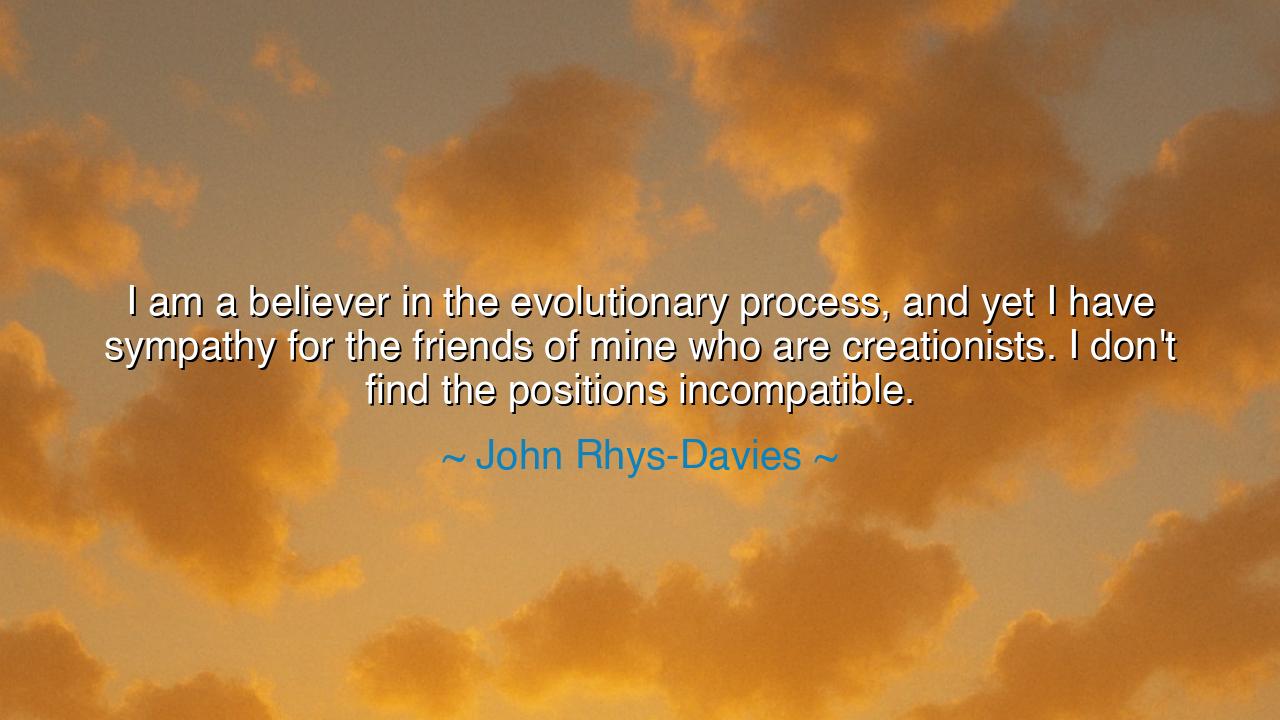
I am a believer in the evolutionary process, and yet I have
I am a believer in the evolutionary process, and yet I have sympathy for the friends of mine who are creationists. I don't find the positions incompatible.






In the heart of every human lies a quest for understanding the origins of life, the mysteries of creation, and the purpose of existence itself. John Rhys-Davies, with his words, “I am a believer in the evolutionary process, and yet I have sympathy for the friends of mine who are creationists. I don’t find the positions incompatible,” speaks to a deep and enduring conflict that has shaped the way people think about the world: the tension between faith and reason, between the teachings of religion and the discoveries of science. In his statement, there lies a profound wisdom, a call for understanding, and a recognition that, while our views may differ, we must approach these questions not with division, but with an open heart and a willingness to learn.
This tension between faith and reason is not new. From the ancient world, humanity has sought to understand its place in the universe, and this quest has often led to deep conflicts between those who relied on the teachings of the gods and those who sought knowledge through observation and inquiry. In ancient Greece, the philosopher Socrates famously questioned the established beliefs of his time, seeking truth not through dogma but through rational debate and reasoned inquiry. Yet, even Socrates, with his philosophical rigor, did not dismiss the importance of the divine in shaping human life. His was a search for harmony between the mysteries of the gods and the rational principles of the human mind, a balance between spiritual faith and earthly knowledge.
Similarly, the ancient Egyptians combined science and faith in their approach to understanding the cosmos. They built their pyramids with an understanding of mathematics and engineering, but their creation story—the journey of the sun god Ra—was woven into the very structure of their civilization, guiding their understanding of life, death, and the afterlife. The Egyptians did not see the mysteries of the universe as conflicting forces but as complementary aspects of the same truth. In the same way, Rhys-Davies’ statement reveals a recognition that evolutionary science and creationism may not be mutually exclusive, but can, in some minds, exist side by side, offering different perspectives on the same grand mystery of life.
In medieval times, the Church held the power to define truth, but even then, the conflict between faith and reason was not fully resolved. Thomas Aquinas, a Christian philosopher, sought to reconcile faith with the discoveries of Aristotle and other philosophers, arguing that both could coexist, for reason and faith, in his view, both came from the same divine source. Aquinas did not deny the existence of the divine but rather sought to show that reason and science could illuminate the truth of God’s creation. This idea echoes in Rhys-Davies’ own acknowledgment of the evolutionary process and his sympathy for those who hold to the idea of creationism. Aquinas’ work shows that belief in the divine and acceptance of scientific principles need not be at odds but can instead deepen our understanding of the world.
Rhys-Davies’ personal approach to this conflict—the acceptance of both evolutionary science and creationist faith—is a call for unity in a world too often divided by ideological lines. It is easy to let differences—be they in politics, religion, or science—create barriers between us, but the deeper truth is that all human beings are bound by a common desire: the search for meaning. Science offers us the tools to understand the mechanisms of the world, to peer into the mysteries of life’s origins. Faith, on the other hand, offers us a deeper purpose, an understanding of our existence in the grander context of the universe. Both are essential to the human experience, and neither can offer all the answers alone.
In our own time, we are called to embrace the wisdom of harmony and understanding that Rhys-Davies so eloquently speaks of. Instead of casting aside the views of others simply because they conflict with our own, we should seek to understand where our perspectives overlap and where they differ. Truth is not always found in absolute certainty but in the willingness to engage with the unknown, to embrace the mystery of life’s origins, whether through faith, science, or a combination of both. By doing so, we acknowledge that each path—whether that of the scientist or the believer—offers valuable insights into the grand design of the universe.
The lesson we must take from Rhys-Davies is that it is possible to hold differing views without division. The human quest for truth should never be a cause for conflict, but rather an opportunity for dialogue, compassion, and understanding. Let us open our minds and hearts, as the ancient philosophers did, to the wisdom of both faith and reason, and let us be guided by the belief that the pursuit of truth, in whatever form it may take, is the highest calling of humanity. In doing so, we may find a deeper connection not only to the mysteries of the universe but to each other.






AAdministratorAdministrator
Welcome, honored guests. Please leave a comment, we will respond soon